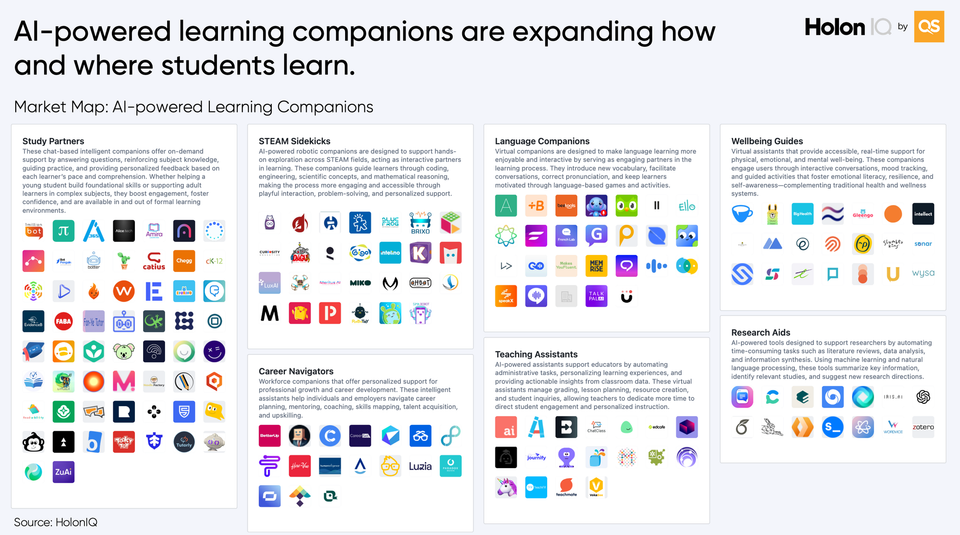📚 Education Financing Innovations + Paris & New York Summits, 2024 Outlook
New tech-driven financing solutions are emerging as alternatives to traditional lenders and government programs amid rising college costs.
Happy Monday 👋
College costs in the are on the rise, especially at private institutions, with demand outpacing supply and administrative complexities pushing tuition costs upwards. New tech-driven financing solutions like micro-loans and crowdfunding platforms are emerging as alternatives to traditional lenders and government loans to improve access to educational opportunities.
This Week's Topics
📚 Education Finance. Unpack the most innovative operators in the education finance space
📊 Charts Spotlight. US college costs have risen continuously since 1970
🧠 Annual AI in Education Survey. Early results see more institutions successfully deploying AI, and efficiency is a key driver for the adoption
📖 2024 Education Outlook. 180+ pages of trends, insights, and data
🇫🇷 Paris and New York Summits. Deep dive into HE futures, new models and digital integration, micro-credentials, digital learner experience & more
💰 Education Deals of the Week. Funding, M&A and grants
Don't forget to check out the 2024 Global Education Outlook and sign up for our new Daily Newsletters, Chart of the Day , and Impact Capital Markets. For more information about how HolonIQ supports Higher Education, request a demo.
📚 Education Finance Landscape
Following trends in other industries, new tech-enabled solutions for financing education have gained traction over the past few years. Solutions offering 'learn now, pay later' models, crowdfunding platforms, micro-lending, and re-financing options for learners provide easy-to-use, membership-based solutions that are challenging traditional lenders such as grants, and educational savings plan loans, and scholarship providers. Educational institutions leverage financial aid management systems and endowment management strategies to support students and ensure financial sustainability. Governments also play a crucial role by implementing policies and programs aimed at expanding access to education through subsidies, grants, and loan forgiveness initiatives. Moreover, emerging technologies and financial innovations are reshaping the landscape, driving greater accessibility, efficiency, and transparency in financing educational pursuits.
Student debt and financing have been the central discussion point surrounding education financing. The Biden administration has introduced a revised student loan forgiveness proposal, aiming to cancel debt beyond the original balance for borrowers under $120,000 and up to $20,000 for unpaid interest, benefiting over 25 million federal student borrowers. On April 12, President Biden forgave $7.4B in loans for approximately 277,000 borrowers. Student loan forgiveness will remain in the spotlight heavily in the US with the upcoming presidential elections.
📚 Education Finance - Market Map
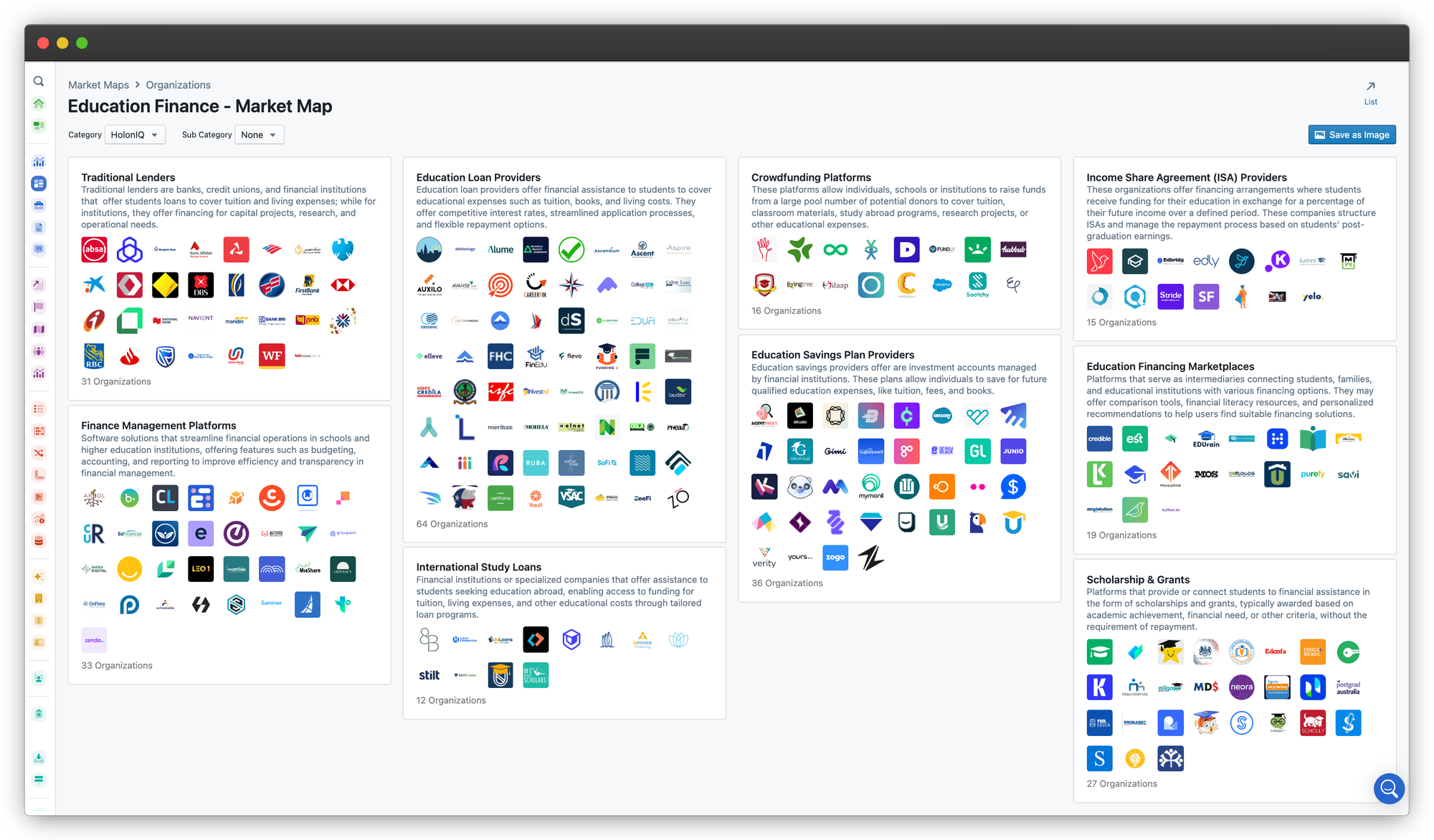
📊 Charts Spotlight - US College Costs Have Risen Continuously Since 1970
Subscribe to HolonIQ's 'Chart of the Day,' a daily newsletter that helps explain the global impact economy, from climate tech to education and healthcare.
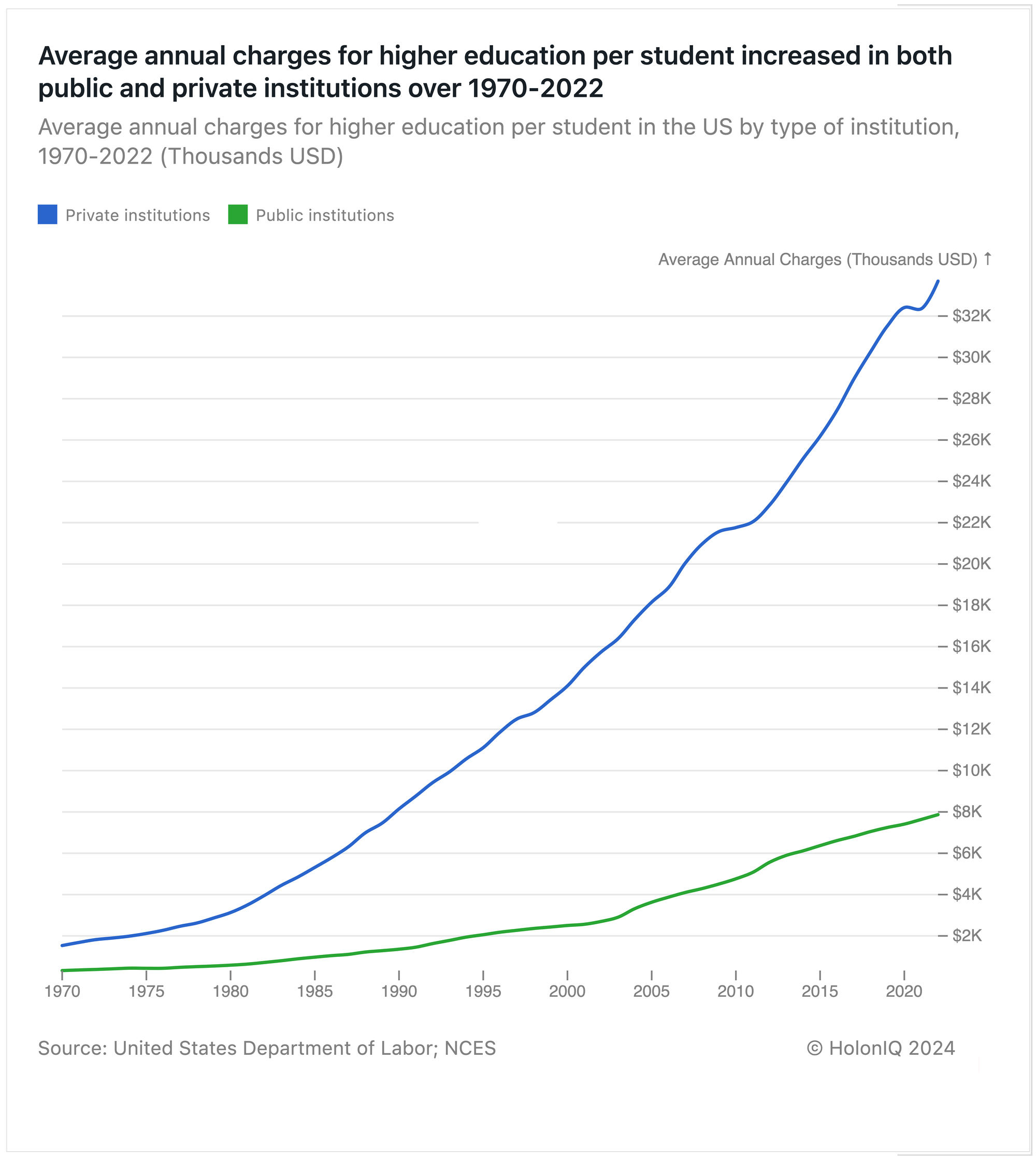
Since 1970, the cost of a college education in the US has steadily risen, with private institutions experiencing a faster rate of increase. This rise coincided with increased student loan availability and financing options, which arguably fueled demand for higher education. The number of college students surged by approximately 7M between 1990 and 2020, likely driven by the perceived value of a college degree for social mobility and employer preference for college graduates. However, this demand outpaced the available supply, putting upward pressure on tuition costs. Additionally, the growing complexity of higher education administration necessitated an increase in administrative staff, further raising costs. Despite a 36.5% increase in US state funding over the past five years, the cost of education continues to climb annually. Leading US universities are projected to surpass $100,000 in attendance costs within the next few years.
🇫🇷 Higher Education Summits - Paris & New York
Join us in Paris on June 27 for this year's Future of Higher Education and Workforce Summit and connect with Higher Education Leaders from across Europe and around the world. NEOMA Business School is our hosting partner this year, and we'll meet at the school's Paris campus, located in the dynamic Butte-aux-Cailles district.
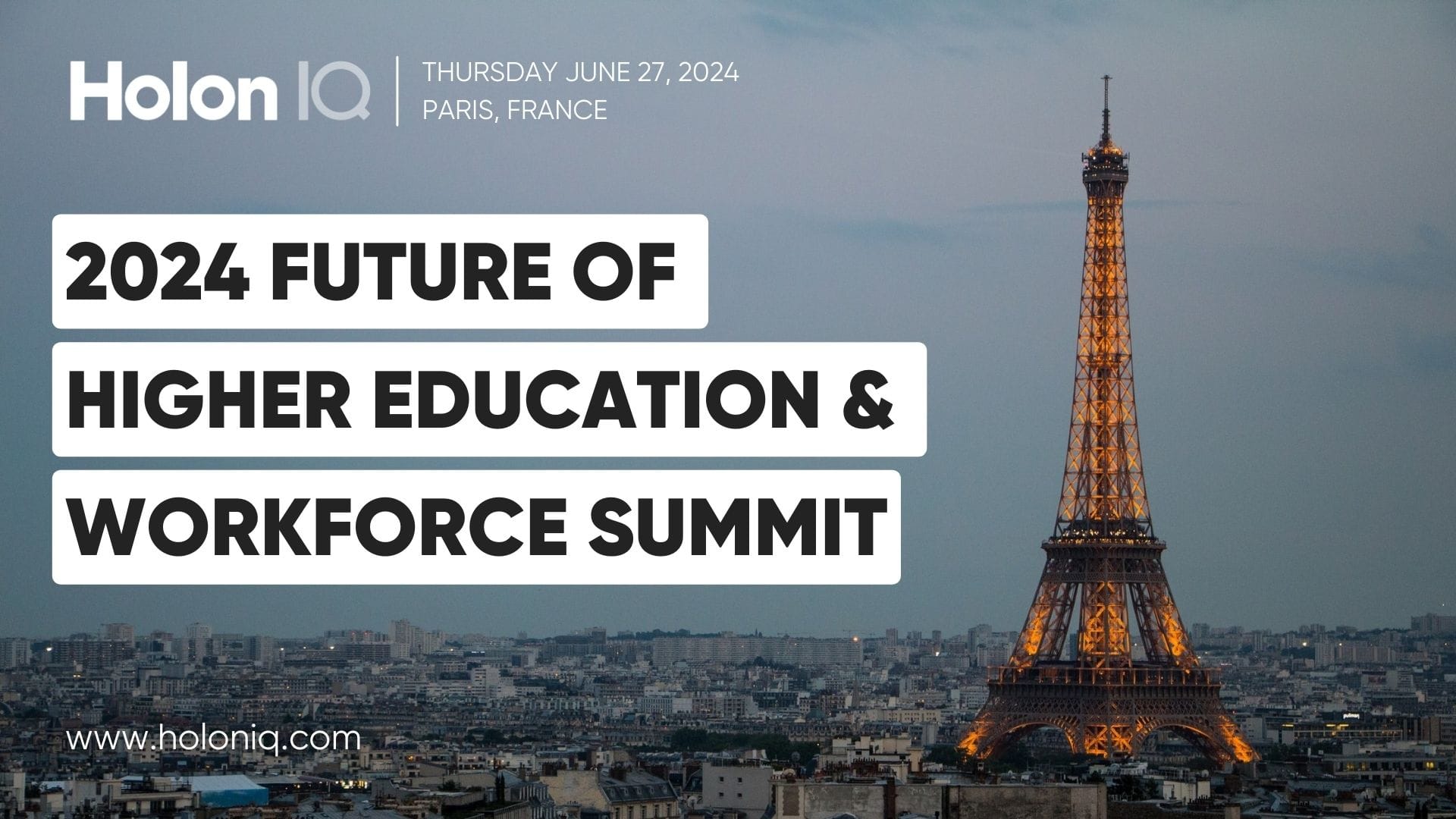
Registration for our flagship Back to School Summit in New York, September 10-11, is now open. This year, we're bringing over 500 global education leaders together for three incredible tracks: Higher Education and Workforce, Foundation and Philanthropy, and Technology and Finance.
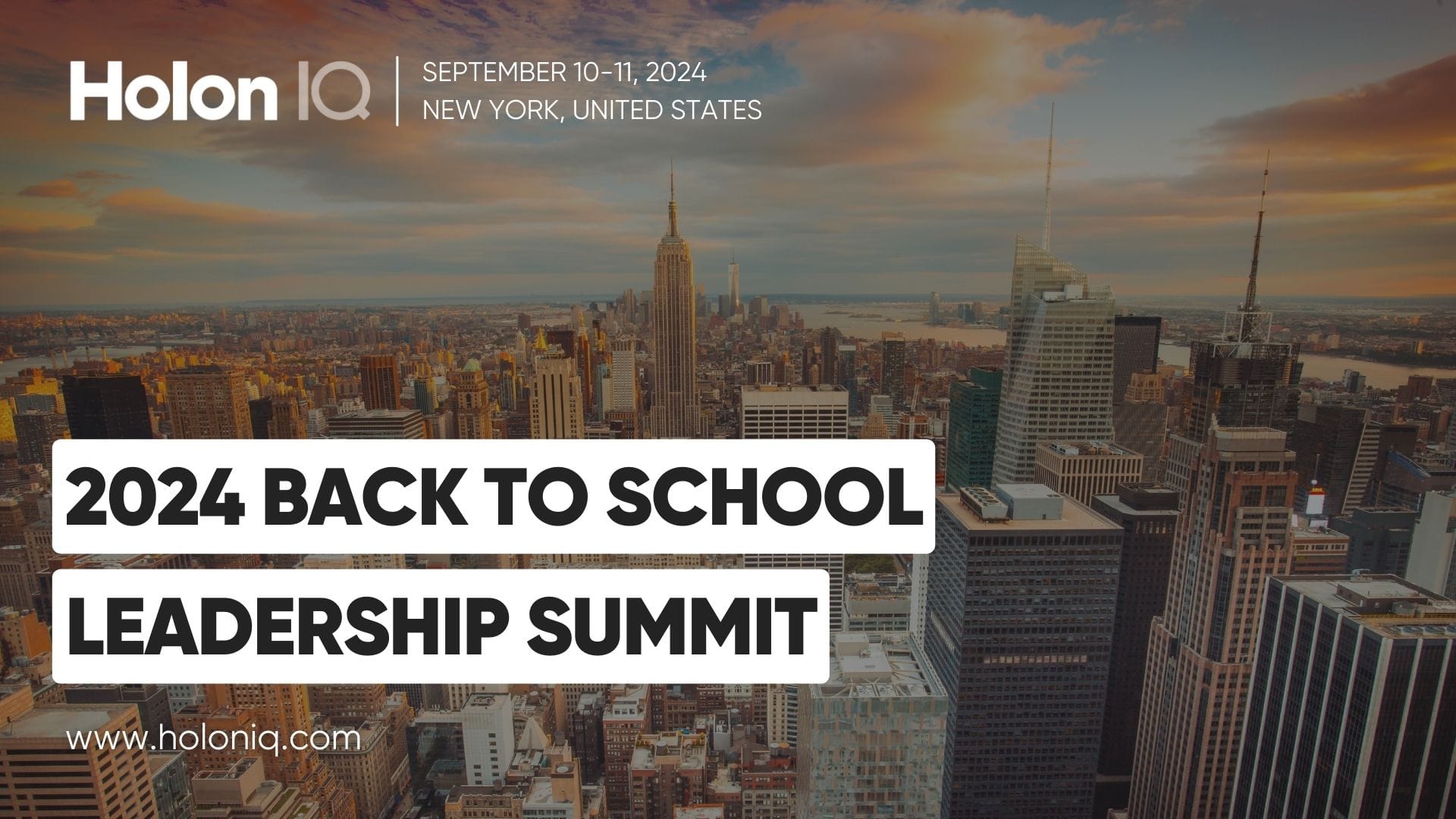
🧠 Participate in HolonIQ's Annual AI in Education Survey
Interim results of this year's annual AI in Education Survey show a marked increase in education institutions that have invested in and successfully deployed artificial intelligence. Cost savings resulting from automation are among the top reasons for the adoption of AI. Participate in the survey to receive the report.
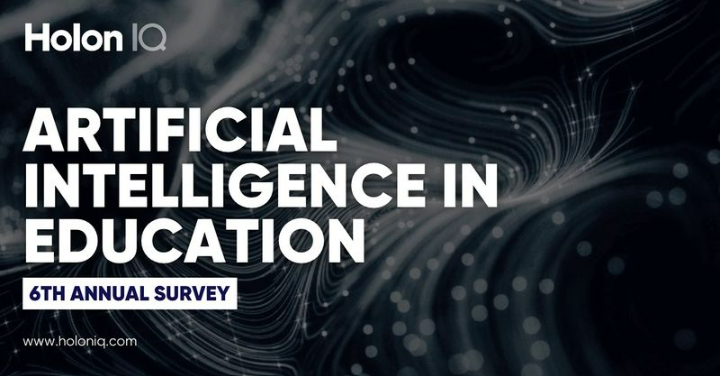
📖 2024 Global Education Outlook
HolonIQ's annual analysis of the global education economy offers over 180 pages of in-depth insights on market data, investments, strategic shifts, and trends in education. Download the extract or purchase the full report.
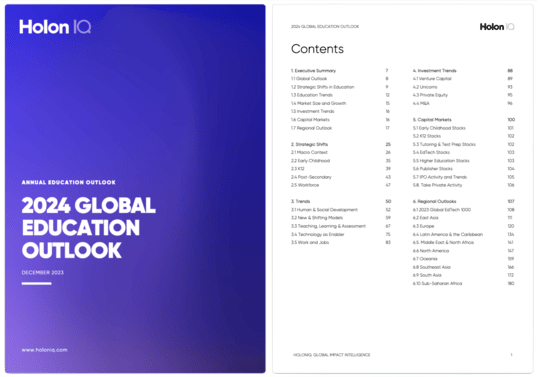
💰 University Deals of the Week
HolonIQ actively monitors and tracks funding flows in universities, spanning all regions and transaction categories. Subscribe to our Daily Capital Markets newsletter to catch the top deals each day.
University Grants
🎭 The Mellon Foundation has awarded $25M in grant funding to five public colleges and universities to establish paid internship programs for humanities majors. California State University, Fresno; the City College of New York; Old Dominion University in Norfolk, Virginia; the University of Missouri - Kansas City; and the University of North Carolina Greensboro will each receive $5M.
🔒 Texas Tech University received $199,349 from the U.S. Department of Commerce's National Institute of Standards and Technology to enhance training for the cybersecurity workforce.
🔍 The Social Science and Humanities Research Council of Canada (SSHRC) announced the recipients of its latest Partnership Engage Grants competition, awarding $100,000 to four McGill University researchers.
Thank you for reading. Have a great week ahead!
Have some feedback or want to sponsor this newsletter? Let us know at hello@holoniq.com

